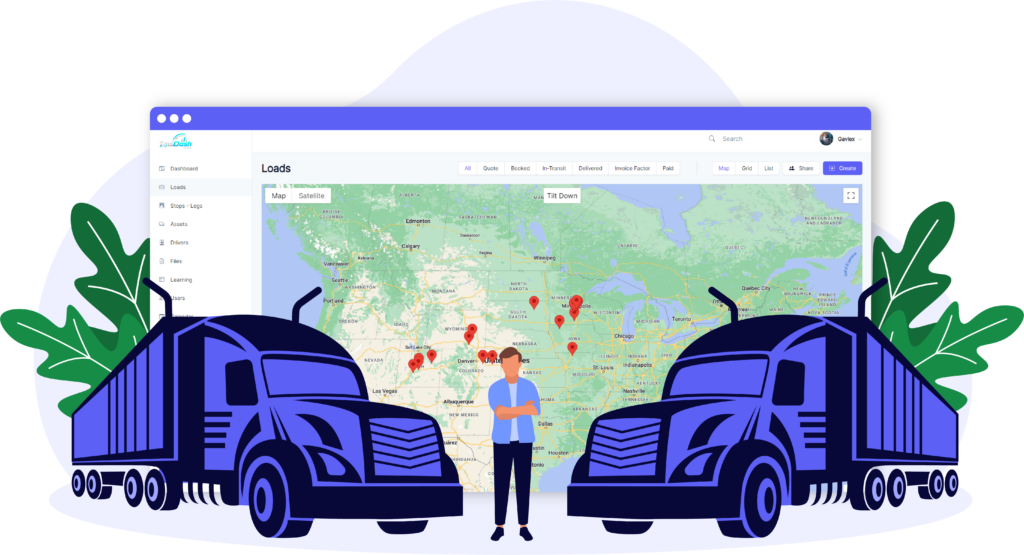Key Functions & Benefits of a TMS

Key Functions & Benefits of a TMS
A TMS (transportation management system) is a software solution that helps shippers and carriers manage the shipping process. TMS automates many of the tasks involved in shipping, from routing to invoicing, and provides real-time visibility into the status of shipments. TMS can also help optimize the shipping process by providing analytics that can be used to streamline operations and improve delivery times.
TMS automates many of the tasks involved in routing and managing freight, including shipment tracking, invoice management, and analytics. By optimizing the shipping process, TMS can help businesses save money on delivery costs and improve customer satisfaction.
TMS can also help to optimize the use of resources, such as carrier capacity, and can provide valuable insights through analytics. A transportation management system (TMS) is a software application that helps organizations plan, execute, and track their freight shipments. A TMS can help carriers, shippers, and other supply chain partners manage and optimize their shipping process. TMS automates many of the tasks involved in shipping, from routing to invoicing. This can help streamline the shipping process and make it more efficient. TMS also provides real-time visibility into the status of shipments, which can help optimize delivery times.
The benefits of a TMS
The benefits of a transportation management system (TMS) are many and varied. Perhaps the most obvious benefit is the modern transportation management that TMS provides. This can include things like better supply chain management, visibility into carrier performance, and more efficient delivery of freight. But there are other benefits as well, such as the ability to get real-time information about your shipments, which can help you make better decisions about your shipping operations. In short, a TMS can provide a lot of benefits to your business, both in terms of efficiency and cost savings.
A TMS can offer many benefits to a company, including visibility into the status of shipments, modern transportation management features, and the ability to work with various types of carriers. TMS systems can also provide real-time tracking of shipments and delivery times, which can be beneficial for companies that need to manage their supply chain in a more efficient manner. In addition, TMS systems can help companies save on freight costs by consolidating shipments and using carrier optimization features.
With the right TMS, businesses can enjoy better visibility and control over their shipments, which leads to improved delivery times and freight costs. In addition, a TMS provides real-time tracking of shipments, so businesses can always know where their goods are and when they will be delivered. Ultimately, a TMS helps businesses improve their supply chain management and save money on transportation costs.
Why You Should Invest in a TMS
If you’re a shipper, you know that managing your supply chain can be a complex and time-consuming task. But what if there were a way to make it simpler and more efficient? A TMS (transportation management system) can help you do just that.
Here are four reasons why you should invest in a TMS:
1. Save time and money: A TMS can help you streamline your shipping operations, which can save you time and money.
2. Improve customer service: A TMS can help you keep track of your shipments, so you can provide your customers with up-to-date information on the status of their orders.
3. Reduce risk: A TMS can help you avoid costly delays and disruptions by providing visibility into your supply chain.
4. Gain a competitive edge: A TMS can give you an edge over your competition by helping you optimize your shipping operations.
If you are a shipper, you should invest in a TMS. A TMS (Transportation Management System) can help optimize your supply chain by providing visibility into your shipping operations, automating logistics processes, and reducing transportation costs.
A TMS can save you time and money by optimizing your supply chain. By finding the best route for your shipments, a TMS can help reduce your shipping costs. A TMS can also help you manage your inventory, so you can avoid stock-outs and keep your customers happy.
As a shipper, you know that having a dependable supply chain is critical to your business. But what happens when your supply chain is disrupted? When goods are delayed or damaged in transit, it can cost your business time and money. That’s why investing in a TMS is a smart move.
A TMS can help you avoid disruptions by providing real-time visibility into the status of your shipments. It can also help you manage and optimize your supply chain, saving you time and money. In addition, a TMS can help you meet customer expectations by providing accurate ETAs for your shipments.
Investing in a TMS is an investment in your business. It can help you avoid costly disruptions, optimize your supply chain, and meet customer expectations. So why not invest in a TMS today?
Improve Freight Management
Today, many businesses rely on efficient freight management to move their products and supplies. In order to streamline this process, it is important to have a good order management system in place. This will help to keep track of inventory and ensure that orders are filled in a timely manner. By improving your freight management, you can keep your business running smoothly and avoid disruptions in the supply chain.
Freight management is the process of organizing and coordinating the movement of goods and materials by land, sea or air. An efficient freight management system can help improve the speed and accuracy of orders, reduce transportation costs and improve customer satisfaction.
Better freight management can improve your business in a number of ways. Perhaps most importantly, it can help to ensure that orders are fulfilled on time and that products arrive in good condition. Good freight management can also help to keep costs down by reducing waste and making the most efficient use of resources. In short, improving your freight management can have a positive impact on all aspects of your business.
Document Management
Document management is a critical part of supply chain management, as it helps to ensure that all documents related to the supply chain are properly managed and organized. A good document management system can help to optimize the supply chain by reducing costs and improving efficiencies. A transportation management system (TMS) should have a document management system that is specifically designed to help manage the transportation aspects of the supply chain. A good TMS can help to improve the planning and execution of transportation operations, and can also provide valuable analytics and insights into the transportation process. There are many different TMS software vendors available, and each offers different features and capabilities. When choosing a TMS, it is important to select one that best meets the specific needs of your organization.
Reasons to Implement a TMS
TMS software provides many benefits for shippers, including analytics and optimization features that can save time and money. A TMS can help carriers manage their freight more efficiently, providing visibility into delivery times and trends. This can lead to better customer service and improved on-time performance. In addition, a TMS can help reduce claims and invoicing errors.
A Transportation Management System (TMS) can offer many benefits to a company, including analytics and optimization capabilities that can help to save on shipping costs. In addition, a TMS can provide visibility into the shipping process, which can be helpful in tracking delivery times and improving customer service. TMS software can also help to streamline communication between shippers and carriers, which can help to improve the efficiency of the shipping process overall.
There are several key reasons to implement a TMS. Firstly, it provides extensive analytics and reporting capabilities that can help shippers optimize their freight network. Secondly, it gives shippers visibility into carrier performance and delivery metrics. Thirdly, a TMS can help optimize freight routing and carrier selection. And fourthly, it can provide significant cost savings through Freight invoice auditing and automated payment processing.
Execution & Visibility
The execution and visibility of shipments is a critical part of any business that relies on the movement of goods. A good Transportation Management System (TMS) will provide real-time visibility into the location and status of each shipment, allowing businesses to track their inventory and ensure that goods are delivered on time. A good TMS will also provide carrier management features, allowing businesses to select the best possible shipping options for each shipment.
The term “execution” refers to the process of carrying out a plan or activity. In business, execution is the process of turning strategy into action in order to achieve desired results. The term is often used in relation to the movement of goods, as in the execution of a shipment or the movement of goods from one place to another.
Visibility refers to the ability to see and track the progress of a shipment or other activity in real time. It is an important concept in execution, as it allows businesses to track and monitor their shipments and activities in order to ensure that they are on track and meeting their goals.
Carriers play an important role in execution, as they are responsible for transporting goods from one place to another. In many cases, carriers also provide visibility services, which allow businesses to track their shipments in real time.
The execution of a shipment or other activity can be tracked and monitored using a variety of tools, including GPS tracking, sensors, and software platforms such as TMS (Transportation Management System).
The future of TMS
As the world progresses, so does the way we move goods and materials from one place to another. A transportation management system (TMS) is a software application that helps manage the supply chain. It streamlines the shipping process and provides visibility into delivery in real-time. According to a study done by MarketsandMarkets, the TMS market is expected to reach $22.10 billion by 2022. This growth can be attributed to the need for efficient management of shipments, carriers, and resources. TMS provides shippers with the ability to track their shipments in real-time and make changes as necessary. This is crucial in today’s fast-paced world where we rely on just-in-time delivery. By having visibility into the shipment process, shippers can avoid delays and disruptions. TMS is also integrated with ERP systems, which gives organizations a complete view of their supply chain.
Reporting by TMS DASH; Writing by Lisa; Editing by Gavlex

Responses